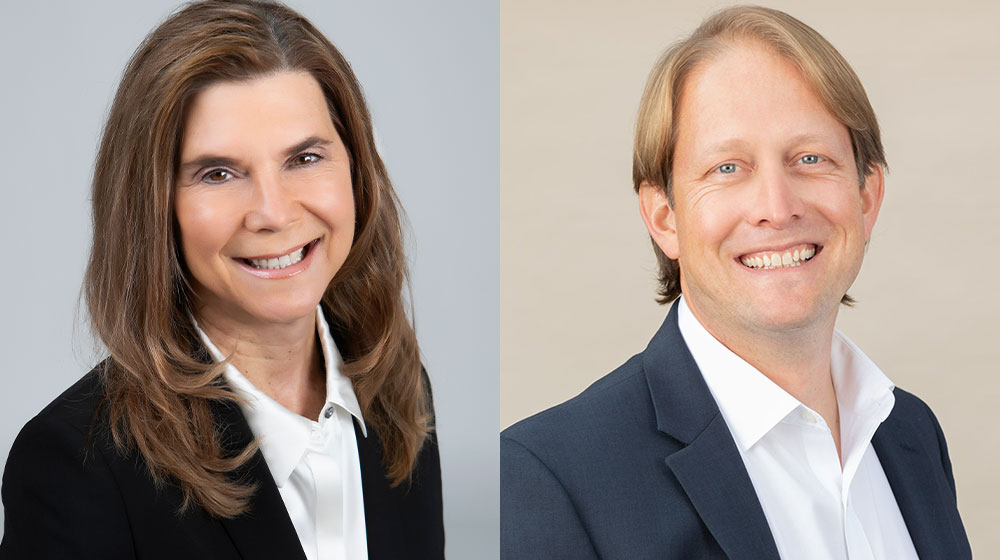Cece Matot and Jim Piper

Cece Matot is the Owner of Matot, Inc. Jim Piper is President of Matot, Inc. / Kelair Dampers, and a former member of the Family Business Center's non-family executive peer group. We asked them to share their perspectives about how Jim's participation in a peer group made a positive impact on the business and family. Check out their interview below!
Interview with Cece Matot, Owner, Matot, Inc.
Q: In what ways did you see Jim benefit from his participation in the FBC non-family executive peer advisory group?
Running a family business as a non-family member is a truly unique position in the business world. Being part of a Peer Advisory Group that was dedicated to this unique position, gave Jim confidence, solutions, camaraderie and connections. He learned about the range of behaviors from family members, both good and bad, that other executives experienced, and how they managed them.
Q: How did your relationship with Jim – and/or that of other family members – benefit from his participation in the group? How did the business benefit?
The business benefitted from Jim’s participation in this group from actionable advice regarding problems we were having at that time. Additionally, group members were usually very generous with their time if he reached out to them, one on one, with specific issues.
I like to believe that our family benefitted by Jim’s being able to compare our behavior with that of other business owning families
Q: What would you say to a family business leader who might be hesitant to have their non-family executive participate in the group, whether because they’re unsure about the benefits, have concerns about the time/financial commitment, or wonder about their non-family executive discussing challenges related to the family/business?
As far as a time commitment to the group, I would say that 4 hours 6-8 times a year is not an unreasonable commitment given the benefits received. Peer advice is invaluable. You can read as many books as you want, or attend multiple seminars, but nothing compares to advice given from people who have been in your position, in similar circumstances. You hear about their successes and equally importantly their failures. Lastly, confidentiality is the cornerstone of all of our Peer Advisory Groups. We all need to talk about our struggles and ask for help. Confidentiality allows us to do this without fear of judgment from outside the group or information being leaked that is not for public knowledge.
Interview with Jim Piper, President, Matot, Inc. / Kelair Dampers, and Former Non-Family Executive Peer Group Member
Q: What were the top 2-3 benefits you experienced when participating in the FBC non-family executive peer advisory group (PAG)?
The most obvious benefit of our PAG was the confidential sharing of ideas and challenges amongst executives across a diverse set of an industries and scale. The availability of such an outstanding network of individuals was HUGE in helping work through industry agnostic business concerns. And, although this provided a safe forum to discuss ongoing or forthcoming family specific challenges, we quite often were simply there to share and listen to typical business gripes (er, strategic plans…). I was honored to be in the room with these PAG members.
Q: What difference did your participation make for you professionally and personally over time?
Professionally the PAG group provided real world guidance through a number of typical company issues that varied from vendor recommendations, compensation considerations, HR compliance, etc. Additionally, given the topic, there was always someone in the room that could assist with anything more specific. Personally, the PAG provided comfort when the “lonely at the top” sensation began to sink in as all members were available outside of our scheduled meeting times for quick chats and check-ins.
Q: What surprised you about the group and/or your participation in it (if anything)?
At times the PAG meetings could certainly have been viewed as a type of therapy session for all members. I was not only surprised by how quickly we bonded as a group, but also how this created a forum to discuss highly sensitive personal and professional issues. There was a high level of trust in the room.
Q: What is a favorite memory you have from your time with the group?
Hard to beat the behind the scenes facilities tours we were afforded by our PAG colleagues over the years.
Q: Do you continue to be connected with one or more people from the group? If so, how and why?
Yes, many of us have stayed in touch primarily because we’ve become good friends. This ranges from quick connections over LinkedIn to periodic lunch dates to say hello.
Q: What would you say to a non-family executive who is hesitant about joining the peer group, whether because they’re unsure about the benefits and/or have concerns about the time/financial commitment?
Although the financial commitment is obviously a case-by-case consideration, I can offer that the time commitment is minimal compared to the wealth and depth of knowledge that will immediately become available once becoming a member. There are no topics that are off limits, the camaraderie and encouragement are extraordinary, and the confidential forum for sharing of concerns is invaluable.
Learn more about joining a peer group
You can learn more about peer groups here. But if you'd like to speak to someone directly, make an appointment with Molly Henry at 312.915.6497 or mhenry11@luc.edu.
Published: May 3, 2022
